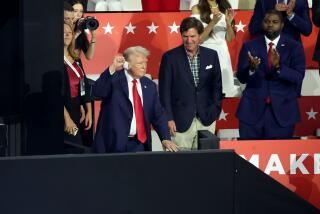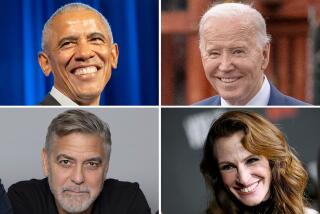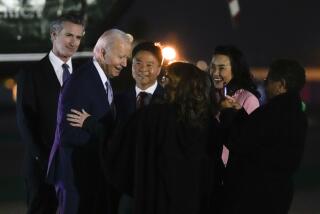Bush Avoids Partisan Sparring as More-Urgent Battles Abound
- Share via
WASHINGTON — When Republican donors gathered Thursday night for a glittering million-dollar fund-raiser here, they observed the latest casualty in the counter-terrorism war: President Bush’s role as the party’s fund-raiser in chief.
Bush stayed away, and in his place was Dick Cheney, adding another line to his resume as a do-it-all vice president.
But the substitution, ordered by Bush himself, was more than another jarring reminder that life is hardly back to normal, even at the White House.
Faced with the war in Afghanistan and the anthrax scare at home, Bush has decided to remain above the partisan fray for the indefinite future.
“The president is focused on the war on terrorism right now,” said one White House aide, noting also that Bush has just returned from China, his first overseas trip since the Sept. 11 attacks.
But the president’s determination to maintain a message of national unity looms as a double-edged sword, one that may carry long-term political consequences for Democrats and Republicans alike, analysts said.
By shunning overtly political activities, Bush is likely to continue enjoying solid bipartisan support for his job performance, thus affording him room to maneuver on a wide range of issues.
Yet the absence of the popular Bush from the moneymaking dinner circuit and the campaign trail can hardly help Republican candidates, such as those running in tough gubernatorial contests in Virginia and New Jersey.
“On the plus side, it’s not bad for the Republicans to have their president have an 88% job approval rating . . . . That can’t hurt the Republicans,” said analyst Stuart Rothenberg.
“But on a more tactical level, the No. 1 thing that a sitting president can do is raise money--he’s a vacuum cleaner for party funds, and now Bush can’t do that,” Rothenberg said.
Just when the president can emerge depends largely on the state of the counter-terrorism effort, according to Rothenberg and Charles Cook, another political analyst here.
Since he became president nine months ago, Bush has helped the party and various candidates raise more than $40 million.
But Rothenberg was not surprised by Bush’s decision to shun “An Evening with President George W. Bush,” the Thursday night fund-raiser for the Republican Governors Assn. The $1-million event was scheduled well before the terrorist attacks.
“At the moment, the president probably is precluded from doing overtly and solely partisan events. His whole message is that we’re one country, we’re united and all our focus is on the bad guys,” Rothenberg said.
“If he starts raising money and doing partisan events, it would seem to undercut his entire message . . . . It would look really crass and partisan and hypocritical.”
Were it not for the attacks on the World Trade Center and the Pentagon, Bush almost certainly would have campaigned for Mark Earley, the Republican candidate for governor of Virginia, Cook said.
As something of a consolation prize, the president hosted the 29 Republican governors Thursday afternoon at the White House.
For Cheney, the opportunity to represent the president is likely to enhance his already strong appeal to party activists.
At the same time, the vice president is unlikely to catch much flak for appearing at a partisan event, Cook said.
“Most of these dinners come after the evening news and generally don’t make a whole lot of news,” Cook said. “I don’t think there’s really a downside or that it’s that big a deal.”
In his remarks at the National Building Museum, Cheney provided a brief update on the counter-terrorism effort and urged Americans to be patient with the heightened security being put in place around the nation. He suggested that the nation think of the measures as ‘the new normalcy.”
Echoing top military and administration officials, the vice president also suggested that the counter-terrorism campaign will not end any time soon. “The conflict will end only with their complete and their permanent destruction,” he said, referring to the terrorists.
Bush’s withdrawal from political activities is likely to be short-lived, although the timing of his reemergence will depend on developments in the counter-terrorism campaign, according to Cook and Rothenberg.
“Things have to get somewhat back to normal before he can dip his toe back into normal politics,” Rothenberg said.
“I would say that Labor Day [of 2002] is when they really need him,” Cook added.
At the White House, spokesman Scott McClellan said no decisions have been made on future events. But he also made clear that Bush in time will put on his partisan hat: “Obviously, elections will continue to be held and the democratic process continues on. And the president will continue to participate.”
More to Read
Get the L.A. Times Politics newsletter
Deeply reported insights into legislation, politics and policy from Sacramento, Washington and beyond. In your inbox twice per week.
You may occasionally receive promotional content from the Los Angeles Times.










